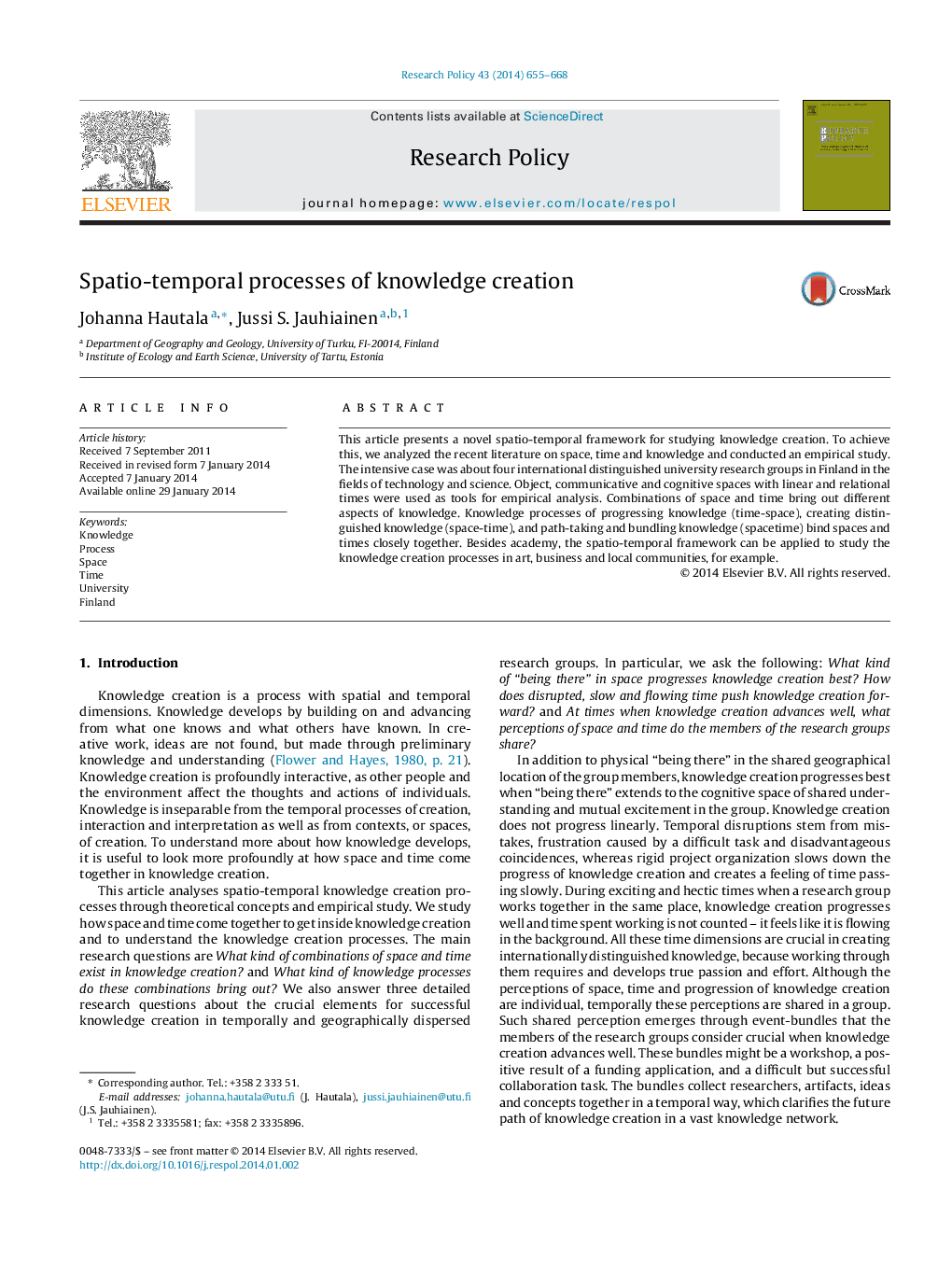| کد مقاله | کد نشریه | سال انتشار | مقاله انگلیسی | نسخه تمام متن |
|---|---|---|---|---|
| 10483031 | 934326 | 2014 | 14 صفحه PDF | دانلود رایگان |
عنوان انگلیسی مقاله ISI
Spatio-temporal processes of knowledge creation
ترجمه فارسی عنوان
فرایندهای فیزیکی زمانبندی دانش
دانلود مقاله + سفارش ترجمه
دانلود مقاله ISI انگلیسی
رایگان برای ایرانیان
کلمات کلیدی
دانش، روند، فضا، زمان، دانشگاه، فنلاند،
ترجمه چکیده
این مقاله چارچوب زمانی جدیدی را برای مطالعه دانش ایجاد می کند. برای رسیدن به این هدف، ما ادبیات اخیر درباره فضا، زمان و دانش را تجزیه و تحلیل کردیم و یک مطالعه تجربی را انجام دادیم. مورد شدید در مورد چهار گروه تحقیقاتی برجسته دانشگاه فنلاند در زمینه فن آوری و علم بود. شیء، فضای ارتباطی و شناختی با زمانهای خطی و رابطه ای به عنوان ابزار برای تحلیل تجربی مورد استفاده قرار گرفت. ترکیب فضا و زمان جنبه های مختلف دانش را به نمایش می گذارد. فرایندهای دانش دانش پیشرفته (فضای زمان)، ایجاد دانش معروف (فضا-زمان)، و دانش مسیریابی و تلفیقی (فضا-زمان)، فضاهای و زمانهای مختلف را با یکدیگر ترکیب می کنند. به غیر از آکادمی، چارچوب فضایی و زمانی می تواند برای مطالعه پروسه های ایجاد دانش در هنر، جوامع تجاری و محلی مورد استفاده قرار گیرد.
موضوعات مرتبط
علوم انسانی و اجتماعی
مدیریت، کسب و کار و حسابداری
کسب و کار و مدیریت بین المللی
چکیده انگلیسی
This article presents a novel spatio-temporal framework for studying knowledge creation. To achieve this, we analyzed the recent literature on space, time and knowledge and conducted an empirical study. The intensive case was about four international distinguished university research groups in Finland in the fields of technology and science. Object, communicative and cognitive spaces with linear and relational times were used as tools for empirical analysis. Combinations of space and time bring out different aspects of knowledge. Knowledge processes of progressing knowledge (time-space), creating distinguished knowledge (space-time), and path-taking and bundling knowledge (spacetime) bind spaces and times closely together. Besides academy, the spatio-temporal framework can be applied to study the knowledge creation processes in art, business and local communities, for example.
ناشر
Database: Elsevier - ScienceDirect (ساینس دایرکت)
Journal: Research Policy - Volume 43, Issue 4, May 2014, Pages 655-668
Journal: Research Policy - Volume 43, Issue 4, May 2014, Pages 655-668
نویسندگان
Johanna Hautala, Jussi S. Jauhiainen,
